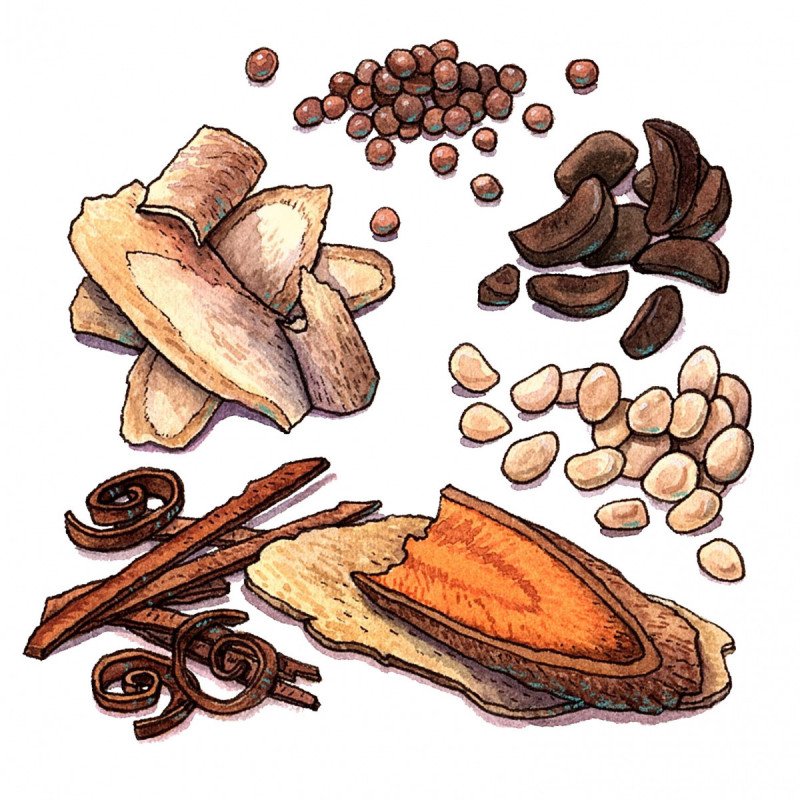
Common Names
- Hemp Seed Pill
- Hemp Seed Formula
- Mashiningan
- TJ-126
For Patients & Caregivers
Tell your healthcare providers about any dietary supplements you’re taking, such as herbs, vitamins, minerals, and natural or home remedies. This will help them manage your care and keep you safe.
Ma Zi Ren Wan (MZRW) is a traditional Chinese medicine (TCM) formula. It’s made up of six different herbs.
Ma Zi Ren Wan is used to:
- Treat constipation (difficult or infrequent bowel movements)
Talk with your healthcare provider before taking herbal formulas. They can interact with some medications and affect how they work. For more information, read the “What else do I need to know?” section below.
Side effects of MZRW may include:
- Abdominal pain
- Cramping and bloating
- Nausea (feeling like you’re going to throw up)
- Vomiting (throwing up)
- Headache
- Diarrhea (loose or watery bowel movements)
- Gas
- Dizziness
- Talk to your healthcare provider if you have tree nut allergy. Ma Zi Ren Wan contains apricot kernels that can cause an allergic reaction.
For Healthcare Professionals
Ma Zi Ren Wan (MZRW) is a traditional Chinese medicine (TCM) formula with a long history of use as a treatment for constipation. Documented in Shang Han Lun (TCM Treatise on Cold-induced Disorders), it consists of six herbs: Huo Ma Ren (Fructus Cannabis), Da Huang (Radix et Rhizoma Rhei), Bai Shao (Radix Paeoniae Alba), Xing Ren (Semen Armeniacae Amarum), Zhi Shi (Fructus Aurantii Immaturus), and Hou Pu (Cortex Magnoliae Officinalis). According to a systematic review, MZRW is the most commonly used herbal formula for constipation in China (1), particularly by elderly patients and women (2) (3). A population-based study reported it is also among the formulas commonly prescribed to prostate cancer patients in Taiwan (4).
Much of available data of MZRW’s clinical effects are limited to Asian populations. In a three-armed randomized controlled trial involving patients with functional constipation, MZRW was found to be equally effective as senna, a popular herbal laxative, in increasing complete spontaneous bowel movement (CSBM). Compared to the senna and placebo groups, the MZRW arm also had a significant increase in colonic transit along with decreased severity in straining, constipation, incomplete evacuation, and global constipation symptoms. Benefits were also more durable in the MZRW group (5). Similar improvements have been reported in other randomized double-blind studies. Patients with functional constipation who took MZRW had increased CSBM and reductions in constipation severity and use of rescue therapy compared to the placebo group (6). In a pilot RCT for palliative cancer patients with constipation, modified MZRW was well-tolerated, increased in stool frequency, and reduced constipation severity and straining versus placebo (16).
A systematic review and meta-analysis (17 trials, 1681 patients) concluded that MZRW is beneficial against functional constipation in Asian populations. In addition, MZRW did not increase adverse events compared to controls (7). Of note, four studies in this review involved pediatric (8) (9) and adult cancer patients with chemotherapy-induced (10) and opioid-associated (11) constipation.
More well-designed trials are needed to strengthen the evidence base surrounding MZRW. Methodologically robust studies are also warranted to determine its potential in relieving non-functional constipation, as well as effectiveness in diverse populations.
- Constipation
The mechanisms of action via which MZRW exerts its effects are not fully known. Findings to date suggest that its components – Fructus Immaturus Citri Aurantii (Zhi Shi), Semen Cannabis Sativae (Ma Zi Ren, also known as Huo Ma Ren) and Semen Pruni Armeniacae (Xing Ren) – may soften stool, reduce water absorption, activate intestinal mucosa, and reestablish gastrointestinal homeostasis to strengthen colonic motility and alleviate constipation (12) (17). Treatment with MZRW has also been associated with decreased levels of circulating oleamide, a known regulator of intestinal motility (13).
Patients with tree nut allergy should avoid MZRW as it contains apricot kernels.
None known.